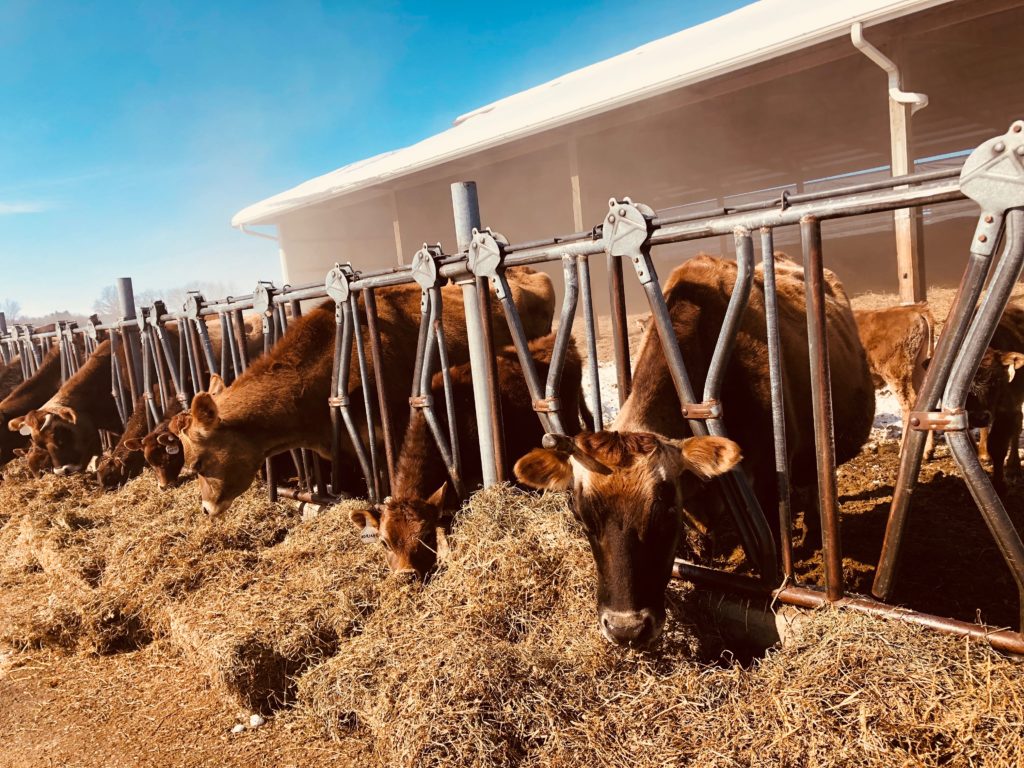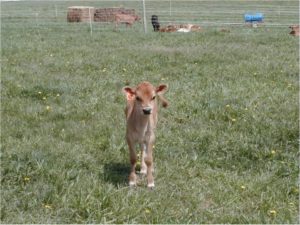Local Food Challenges: Securing fresh food from fertile soil
April 4, 2018Raw milk in Switzerland, France, and Northern Italy
May 5, 2018This article is a collaboration between the Weston A. Price Foundation (WAPF) and the Farm-to-Consumer Legal Defense Fund (FTCLDF).

Wisconsin organic dairy farmer Chaz Self is a face of the crisis confronting milk producers across the country. Self’s cooperative recently dropped him as a member, leaving him scrambling to find another buyer for the milk his farm, Grassway Organics, produces. Self could be making up for some of the lost sales by selling raw milk; Wisconsin law allows the sale of raw milk on an “incidental basis.” The Wisconsin Department of Agriculture, Trade and Consumer Protection (DATCP) could be helping farmers like Self by using its enforcement discretion to let him sell raw milk. DATCP, however, recently served the farmer with a summary special order threatening the loss of his Grade A Milk Permit if he sold any raw milk for human consumption.
The farmer is currently dumping hundreds of gallons of high quality raw milk. Self’s case provides a great look at the unprecedented emergency dairy farmers are facing and how selling raw milk is a potential way to help keep thousands of them in business.
Self maintains a herd of around 100 cows on a 400-acre farm where he lives with his wife Megan and their three young children. His Jersey herd is 100% A2. The Selfs sell poultry, eggs, pork and beef to their customers on the farm and at farmers markets.

Last year Self appeared in the Netflix documentary, Rotten, a series of episodes uncovering fraud and corruption in the industrial food system. Self appeared in the episode “Milk Money” which discussed the production and sale of raw milk. Self never stated that he sold raw milk but the narrator of the episode implied that he did. Shortly after the episode aired, DATCP started investigating Self; the investigation wound up with the department issuing an order allowing him to keep his Grade A permit on the condition that he stop selling raw milk. This was an unjustified move, given that DATCP based its decision solely on what the narrator said he was doing; there was no other evidence mentioned in the order about Self selling raw milk.
To compound matters, on April 1 Self’s cooperative, Westby Creamery, terminated his membership; on April 18 DATCP sent Self a “notice of deadline to change assigned dairy plant”, stating the farmer has until April 30 to find a processor to pick up his milk. If he fails to do so, DATCP will revoke his Grade A permit; with the current state of the dairy industry, that is not an easy task.
The American dairy sector has been in a decades-long decline that is currently accelerating. In 1992 there were 131,535 licensed dairies in the U.S., at the end of 2017 there were 40,219.1 The number of dairies closing shop has increased substantially since the beginning of the year. In 1992 the average herd size for farms was 74 cows; by 2017 it had risen to 2342, showing the consolidation in the dairy industry and the exit of small farms from the commodity milk system.
Wisconsin went from about 29,000 dairy farms in 1995 to a little over 9,000 at the end of last year.1 Two particular recent developments have accelerated the decline of conventional and organic dairies in Wisconsin. First, more conventional milk is being shipped into Wisconsin from other states. In 2017 more than 100 trailer loads of milk per day3 was coming into Wisconsin from states such as Michigan, Indiana and Ohio; frequently this milk was being sold more cheaply than the price sellers of conventional fluid milk would normally get.
Secondly, this year certified organic CAFO dairies in Texas have increased shipments of milk to Wisconsin. According to a USA Today March 24 story by a Milwaukee Journal Sentinel writer, six certified organic dairy farms in Texas produced about 23% more milk than all of Wisconsin’s 453 organic dairy farms combined in 2016.4 The greater supply of organic milk has led to more quotas for producers and co-ops cutting back on members; in addition to Self, Westby Creamery recently terminated the contracts of seven other members.
The commodity milk system is becoming more untenable than ever for small farms. Recent prices around the country for conventional milk have been as low as $1.11 per gallon; while there are some organic producers that are still doing well, prices overall have declined substantially for organic milk. Farmers wanting to sell cows are finding little or no market. Oversupply and lower pay prices mean a race to the bottom for commodity milk.
One way for producers to escape or survive the commodity milk system is to sell raw milk for direct consumption; prices farmers can get for raw milk sales to the consumer are much higher than what they can receive for either conventional or organic milk intended for pasteurization. In Wisconsin the law is there for dairies to sell raw milk and improve their bottom line; the problem has been DATCP and its interpretation of what an “incidental sale” is.
The legislature passed the incidental sale law in 1957. The original intent of the law was that any sale of raw milk for human consumption was an incidental sale. At the time the law went into effect, there were over 100,000 dairies selling raw milk intended for pasteurization in the state 5; for all of them, sales of raw milk for direct human consumption were likely a very small percentage of total sales.
At one time DATCP interpreted the incidental sales law as meaning only one sale of raw milk per customer ever. In 2008 the department changed that, issuing a regulation that stated, “a sale is not incidental if it is made in the regular course of business, or is preceded by any advertising, or solicitation made to the general public through any communications media.” There is nothing in the statute legalizing incidental sales that prohibits advertising or solicitation.
DATCP’s interpretation of “not in the regular course of business” has been unfavorable to raw milk producers and consumers. It’s time for that to change; America’s Dairy Land is in an emergency situation. Dairies are going out of business every day in the state. DATCP can help Wisconsin dairy farms by either adopting a more liberal interpretation of what constitutes “not in the regular course of business” or by waiving enforcement against dairies selling raw milk direct to consumers in the regular course of business. For precedent on the latter step, DATCP only needs to look at the bordering state of Michigan.
Michigan law prohibits the sale or distribution of raw milk for human consumption; nevertheless in 2013 the Michigan Department of Agriculture and Rural Development (MDARD) adopted a written policy in which it would not take action against dairy farms distributing raw milk through herdshare agreements. MDARD set parameters that had to be in place, such as a written contract between the farmer and consumer for it to waive enforcement; DATCP could take a similar tact in Wisconsin.
DATCP is charged with promoting Wisconsin agriculture; one way it can do that with the current dairy crisis is to change its enforcement or interpretation of the law to one that benefits raw milk producers and consumers. Producers like Chaz Self have the quality raw milk and the potential demand to succeed. DATCP shouldn’t be preventing Self from selling raw milk. DATCP has an opportunity to help dairy farms stay in business. Ultimately, it would be great to pass a bill taking the word “incidental” out of the Wisconsin raw milk statute; but with the accelerated decline dairy is going through, there is no time to waste. The department should either adopt a new interpretation of the raw milk law or exercise its enforcement discretion now.
—————————–
[1] Dennis Halladay, “Here it comes: less than 40,000 dairies”, Hoard’s Dairyman, March 19, 2018. Last viewed 4/25/2018 at https://hoards.com/article-22818-here-it-comes-less-than-40000-dairies.html
[2] Corey Geiger, “Dairy farm numbers hover near 40,000”, Hoard’s Dairyman, February 26, 2018. Last viewed 4/25/18 at
https://hoards.com/article-22687-dairy-farm-numbers-hover-near-40000.html
[3] Pete Hardin, “March Dairy Meetings Somber in Wisconsin…”, Milkweed, Issue No. 465, April 2018; p. 5. [Wisconsin Farmers Union, “How Does It Work, and Would it Work Here?”, Dairy Supply Mgmt. in Canada, meeting 15 March 2018 at Dodger Bowl Banquet Center, Dodgerville, WI, recorded by www.wiseye.org; last viewed 4/25/2018 at http://www.wiseye.org/Video-Archive/Event-Detail/evhdid/12277]
[4] Rick Barrett, “Wisconsin’s small organic dairies squeezed by Texas mega-farms”, USA Today, March 24, 2018. Last viewed 4/25/2018 at https://www.usatoday.com/story/money/business/2018/03/24/wisconsins-small-organic-dairies-squeezed-texas-mega-farms/455330002/
[5] U.S. Department of Commerce, “County Table 10 – Dairy products and poultry and poultry products sold from farms: Censuses of 1959 and 1954”, U.S. Census of Agriculture: 1959, Volume 1, Part 14: Wisconsin (Chapter B – Statistics for Counties), p. 163. Last viewed 4/25/2018 at http://usda.mannlib.cornell.edu/usda/AgCensusImages/1959/01/14/866/Table-10.pdf
 Photo courtesy of Grassway Organics LLC facebook page
Photo courtesy of Grassway Organics LLC facebook page


6 Comments
Is there any restriction on raw milk yogurt? I would love to have you use some of the excess for yogurt. I think that you could get a lot of orders for it.
At the present time, the sale of raw milk yogurt is prohibited in Wisconsin.
How can we help? I currently am not on your email list.
Please become a member of WAPF and support the work to expand raw milk access in Wisconsin and elsewhere. Here’s a link to become a member and be added to the mailing list, https://www.westonaprice.org/why-join/
Also consider supporting the Farm-to-Consumer Legal Defense Fund (FTCLDF) by becoming a member. FTCLDF has litigated raw milk cases in Wisconsin including the great court victory for Vernon Hershberger. Here’s the link to the website, https://www.farmtoconsumer.org/
I have a small organic dairy in Vermont state. What is happening with dairy across the country is deplorable. It is so wrong that we are a country that has so much wealth yet so much hidden poverty and hunger yet we are being forced to throw away food. We have to ask, why is this? It is to keep the rich getting richer, with no regard for the land, animals and the rest of the population! It is about time us farmers rebel! I stand whole heartily with you!
Wisconsin could learn a lot from our successful Wyoming Food Freedom Act. I’m scared that the powerful dairy industry lobbyists have too much power. If enough small farmers got together they could break that stranglehold using the mantra of the travesty of big government controlling local farmers. Also the state of Idaho has done a phenomenal job in supporting raw milk farms.
https://www.farmtoconsumer.org/blog/2017/03/28/wyoming-expands-food-freedom-act/